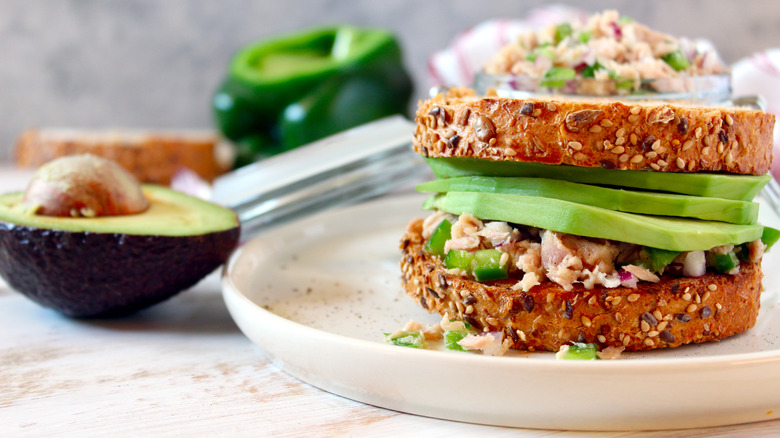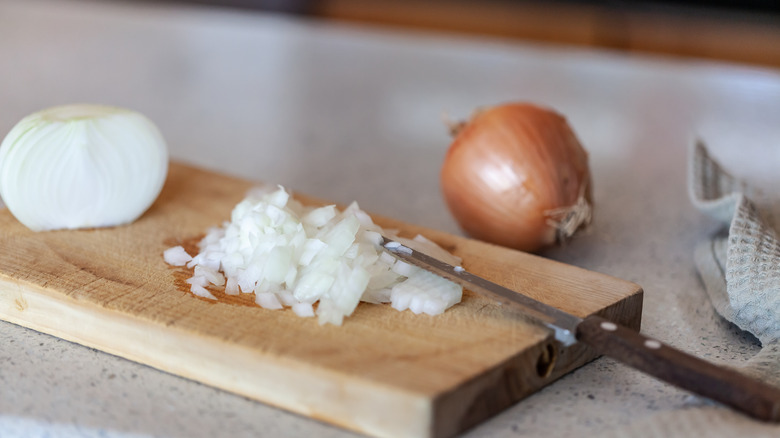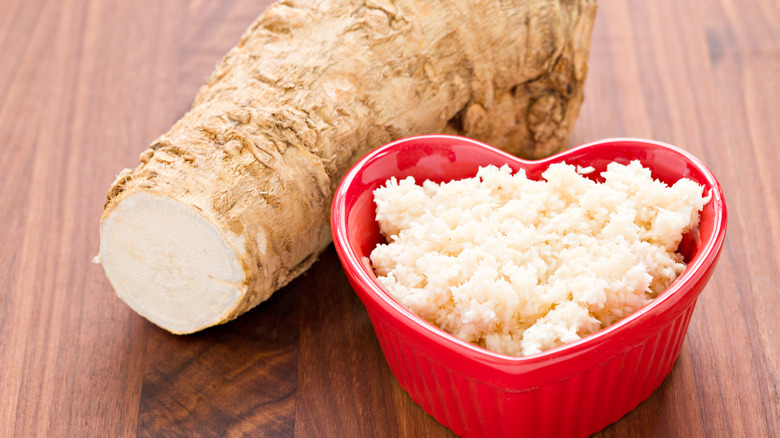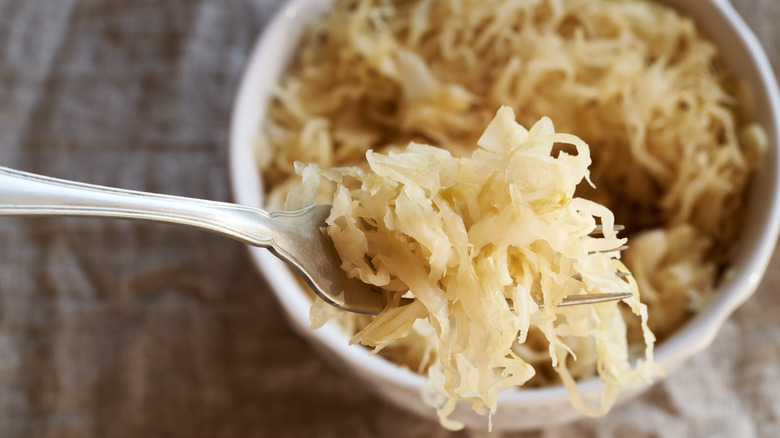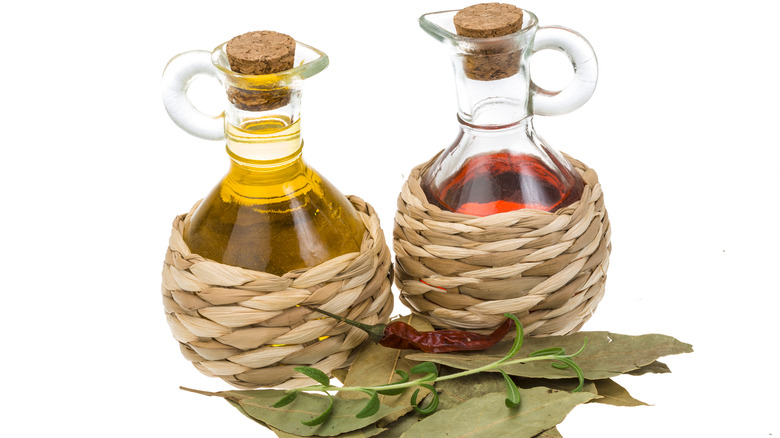The Healthiest And Unhealthiest Toppings For Your Deli Sandwich
Deli sandwiches are the perfect lunch, and you can't tell us otherwise. Whether you make the sandwich yourself at home or pick it up from the local deli — they can be an easy, nutritious, and tasty lunch to keep you fueled for the rest of the day.
Not only can sandwiches provide you with great nutritional value, but there are also so many varieties and recipes that you can try so that your taste buds never get bored. You could always go for the classic turkey sandwich, go for a ham and cheese, make it fancy with all the meats with an Italian sandwich, or stray from the deli meat path and go for a tuna salad, chicken salad, or veggie salad sandwich.
Not only can you choose from a large variety of sandwich styles themselves, but you can make each individual type taste different with various toppings. Now, some toppings can add to the nutritional value of the sandwich immensely, and some completely take down the "healthy" points quite a bit.
We want you to make informed decisions when building your sandwich, and know which condiments or toppings can do more harm than good, and which ones you should focus on adding to help get more health benefits. In this list, we dove into the nutritional information for each item. Whether they were high in calories, or high in beneficial vitamins and minerals, we uncover it all.
Healthy: Avocado
Avocado can be added to almost any type of deli sandwich. With its mild and creamy taste, it goes well with many different flavor profiles. It can help cool down a spicy chicken sandwich, add a soft creaminess to a bacon lettuce and tomato, or add more depth to a tuna salad sandwich.
The great thing about avocado is that it provides tons of nutritional benefits. Some people think that they need to stray away from avocado because it is mainly a source of fat — but that doesn't have to be a bad thing. The fat in avocado is mainly healthy fat that is extremely beneficial for our health. It can help lower cholesterol and blood pressure, which keeps your heart healthy and strong.
In one medium avocado, there are 22 grams of fat. The FDA recommends consuming 78 grams of fat per day (based on a 2,000 calorie diet). If you are getting a large amount of your daily fat from avocado, that is the way to do it! You will also reap other health benefits, like getting a large serving of potassium (even more than you'd get from a banana), vitamin E, and vitamin K. All of these contribute to better health.
Healthy: Tomatoes
Tomatoes are a sandwich staple. They're most commonly seen on deli sandwiches with turkey, ham, bacon, or other meats. They contribute to the cold, fresh, flavorful taste that is expected in a deli sandwich. Not only do tomatoes taste great, especially if they're perfectly ripe, but they're good for you, too.
The reason that tomatoes have that signature, bright red color, is because of an organic compound found in them called lycopene. Lycopene is an antioxidant, which helps prevent or delay cell damage in the body. Getting many sources of antioxidants daily is great for your overall immune health, organ health, and more.
Tomatoes are also high in vitamins and minerals. In one medium tomato, there is about 28% of the daily recommended dose of vitamin C. Great for your body internally as well as your skin externally, vitamin C repairs cells and tissues — which is extremely important for your overall health.
Tomatoes can also help up your fiber count in your sandwich, making it more filling and beneficial. Having fiber in your meals also aids in digestive health. Overall, tomatoes can add a fresh, tasty flavor to your sandwich while providing great health benefits.
Not Healthy: Mayonnaise
Many people love mayonnaise as their go-to condiment for sandwiches. Since it's commonly used for spreads on turkey or ham sandwiches, and is also used as a primary ingredient for tuna, egg, or chicken salads — we understand that it's disappointing to know that mayonnaise isn't the healthiest.
In one tablespoon of mayonnaise (let's be real, we all use a little bit more), there are 94 calories. Within those calories, there are about 10 grams of fat. Generally, if you are getting that much fat from something more substantial like an avocado, it's okay. But, if you're using 10 grams on just a spread for your sandwich, you may want to rethink that. Mayonnaise has a small amount of vitamins and minerals, but it doesn't compare to other nutrient dense foods. Overall, it adds more calories to your meal without providing as many health benefits as other toppings can.
A great alternative to mayonnaise is hummus. Try adding that to your sandwich instead, and you'll be getting some fiber, vitamins, and minerals that will overall add more nutritious density to your sandwich that mayonnaise doesn't provide. You can also substitute with an avocado spread — which will still get you some fat, but it's paired with other beneficial nutrients as well.
Healthy: Mustard
Next time you're deciding whether you should put mustard or mayonnaise on your sandwich — know that mustard provides more health benefits. As far as taste goes, mustard and mayo have completely different flavor profiles. They tend to go well with many of the same types of sandwiches, however.
Choosing to spread some mustard onto your bread before building up your sandwich is a great idea. Not only will it enhance the overall flavor, but it will also amp up the nutrients that your sandwich is providing. Not many people know this, but mustard was actually originally used in ancient Rome and Greece for traditional medicine remedies.
There are many different things that mustard can do for the body. Mustard has phytochemicals, which can help fight cancer in the body. It also has calcium, magnesium, and phosphorus which can contribute to healthier bones and teeth. In addition, it is known to potentially protect the body from bacterial infections. Not only does mustard boost the flavors of your sandwich, but it can give your body an extra boost, too!
Healthy: Pickles
Who doesn't love that perfect crunch you get when you have pickles or cucumbers on your sandwich? Whether you enjoy the fresh taste of a cucumber or the vinegary flavor of a pickle, both can taste amazing on a variety of sandwiches — and they're good for you, too.
Just looking at the nutrition information for cucumbers themselves, they are incredibly nutrient dense. In just a small amount, there are tons of great things packed in. In just one cucumber, there's 45 calories (which is a low, great amount for a topping). It is mostly carbohydrates, with 11 grams of carbs and 1 ½ grams of fiber. There are also 2 grams of protein. For something that's made up of 95% water, that's pretty great.
Beyond that, cucumbers have vitamin C, K, magnesium, and potassium. Together, magnesium and potassium can be great for heart health by supporting healthy blood pressure levels. Vitamin C and K both help with bone health.
Now, if you take it a step further and choose pickles over cucumbers, there are even more health benefits. The pickle juice (which is made with vinegar) can actually help aid in keeping blood sugar levels even. For someone with diabetes, pickles are great to add to your meals. Keeping blood sugar levels even also helps with satiation, minimizing the chance of having intense food cravings later on.
Healthy: Onions
Onions are commonly used in hundreds of thousands of recipes. It's a great way to boost the flavor of almost any dish, and they taste especially great on a sandwich. Similar to pickles and cucumbers, onions add a tasty crunch without adding too many calories.
In a medium onion, there are only 44 calories. Now, most people aren't going to put an entire onion on a sandwich (but you do you, we're not judging). Considering that, onions barely add anything in a caloric sense to your sandwich. That could be seen as a positive thing, especially if you're loading up your sandwich with many other toppings.
What onions do contribute to a sandwich besides good taste, however, is many vitamins and minerals that can aid in your overall health. There are antioxidants in onions, which can help fight inflammation in the body. When there are high levels of inflammation in the body, it can lead to cardiovascular disease, digestive diseases, and mental health issues. Stress, poor sleep, and alcohol can cause inflammation — so incorporating foods like onions into your meals can contribute to a healthier diet that fights inflammation in the body.
Not Healthy: Bacon
Most people love the mouth watering, crunchy, flavorful meat that is bacon. However, it is definitely one of the unhealthiest protein options that you can add to your sandwich. Even though the taste is unparalleled, it might be a good idea to only add bacon to your sandwiches every once in a while.
Bacon is a processed meat that has high levels of saturated fats and sodium. Both of these can increase the risk of heart disease. Saturated fat directly raises the bad cholesterol in our body, which can cause clogged arteries (the cause of heart attacks and strokes). A diet high in sodium is also known to affect the body in a similar way.
In about three pieces of bacon, there are 12 grams of fat and 579 milligrams of sodium. For someone eating a 2,000 calorie diet, that's a high amount of fat and sodium for just a topping on a sandwich. Especially if your sandwich already has a protein source like turkey or chicken, is it really necessary? If you are stuck on the idea of having that extra meat — try an alternative. You can replace bacon with turkey bacon to lower the fat count. You can even try out some fake bacon products – just make sure to read the nutrition panel.
Healthy: Spinach
Spinach is hands down one of the best things you can add to a sandwich. As a leafy green vegetable, it's a nutritious ingredient that many people don't get enough of in their diets. What's an easier way to incorporate it then by throwing it on your favorite sandwich?
The American Heart Association recommends that adults get five servings of vegetables a day. Most people are eating way below that. Many people find that vegetables go bad quickly, are expensive to get fresh, and are difficult to incorporate into meals. Something like spinach, however, is a great option to keep in your refrigerator. Along with being included in sandwiches, you can also throw spinach into your morning eggs, your evening pasta dishes, or use it as a base to a delicious side salad.
Spinach is packed with tons of health benefits. It has antioxidants and potassium which are great for heart health, vitamin K which boosts brain health, fiber for gut health, and iron which helps with healthy blood and muscles. All of these properties contribute to fantastic overall health, and you are only helping yourself by adding spinach to your sandwich.
Not Healthy: American cheese
Most people's favorite part of a great deli sandwich is the cheese. Now, there are so many different types of cheeses to choose from — but so many people love to go with the classic: American cheese. For some people, American cheese can't really be considered a real cheese – and they might be onto something.
Compared to how other cheeses are made, American cheese is very processed. It's generally made with a blend of cheeses, milk protein concentrate, whey, milk, and many other ingredients. It's simply not as pure as regular cheese is.
When looking at the nutritional value of American cheese, one slice does give a good amount of protein per slice (around 5 grams). However, it also has a lot of fat — 9 grams to be exact. Most people don't only put one slice on a sandwich, either, so we're looking at around 18 grams of fat from just cheese on your sandwich.
Another popular cheese to put on deli sandwiches is provolone. In one slice of provolone, you get 7 grams of protein and about 6 grams of fat. That's a much better ratio than the American cheese. You will lower your overall fat count, but have more protein to make the meal more satiating. We recommend choosing provolone over American cheese.
Healthy: Horseradish
Horseradish is a delicious topping that is traditionally put on deli sandwiches with red meat, like roast beef or corned beef sandwiches. Horseradish itself is a root vegetable that is known to be a bit spicy. It has many health benefits that are great to add to your sandwiches.
Most people don't put straight horseradish onto their sandwiches, however. They usually use a pre-packaged sauce instead, and apply it as a spread or drizzle to the inside of the sandwich. A little goes a long way with horseradish because of its strong flavor. Some people even say it tastes similar to wasabi. Because of this, you won't be racking up the calories on your sandwich due to horseradish.
Overall, horseradish can help reduce inflammation in the body and potentially fight against cancer cells. It also has antibacterial properties and can improve respiratory health, too. It's definitely a great topping to add to your meal.
Healthy: Sauerkraut
Sauerkraut is a delicious fermented topping that tastes great on deli classics like Reubens, turkey sandwiches, and ham and cheeses. Sauerkraut is basically fermented cabbage, and it has a salty and slightly sour flavor. It adds an interesting taste and texture to sandwiches — but it's also great for your gut.
Since sauerkraut is fermented, it has tons of healthy bacteria within it. This helps populate the gut with healthy bacteria which can help fight the bad bacteria — ultimately strengthening the gut. Having a healthy gut relates directly to the health of your immune system. So, not only will you be improving your digestive health, but you'll be improving your body's ability to fight off sickness as well. Scientists also believe that a healthy gut impacts your mental health, too. Overall — a healthy gut is a happy body.
Sauerkraut is also naturally low in calories but at the same time it's high in fiber. That adds extra nutrients to the sandwich without racking up the calorie count. With the crunchy and tasty components of the sauerkraut on your sandwich plus the extra fiber, you'll surely be satiated.
Healthy: Oil and vinegar
One of the most delicious things to put on a deli sandwich is oil and vinegar. It's a classic that most sub shops automatically put on the sandwiches without even asking the customer. It adds a boost to every bite, makes the sandwich lose any sense of dryness, and adds some health benefits as well.
Most people know that olive oil is considered one of the healthy oils to use when cooking. It does contain a large amount of fat, nearly 10 grams per serving, but the fat is mostly unsaturated. Overall, the unsaturated fats help lower cholesterol which can lead to better heart health. There are also properties in olive oil that help with inflammation in the body. You don't want to be overdoing it either, though, so keep the serving sizes in mind. Vinegar, on the other hand, contains a good amount of antioxidants, which is great for the immune system. Together, oil and vinegar work well taste wise and health wise, so don't hesitate to drizzle them onto your next sandwich.
Methodology
When looking at what toppings were healthy or unhealthy, we paid attention to a few key things: amounts of calories, fat, protein, carbohydrates, vitamins, and minerals. Ingredients that were too high in fat (saturated especially) didn't make the cut. Other ingredients that had higher protein, unsaturated fats, or high levels of vitamins and minerals were considered healthy. Ingredients that didn't provide any substantial health benefits were not recommended as a topping.

